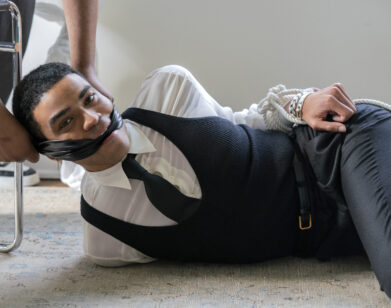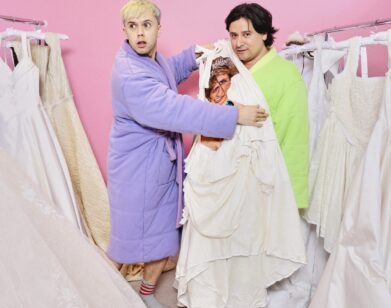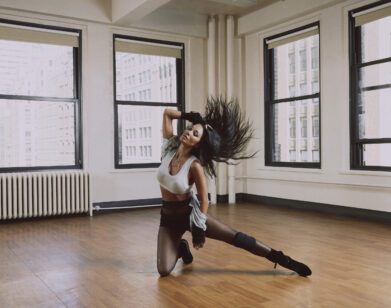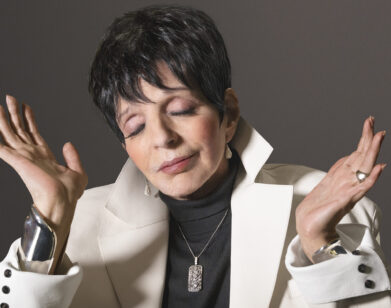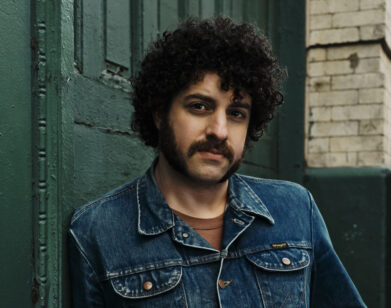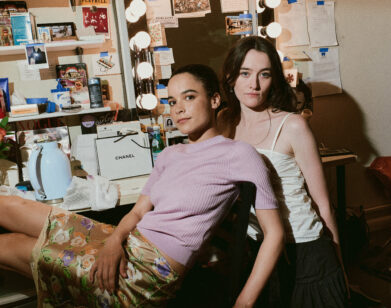icon(s)
Bernadette Peters and Lin-Manuel Miranda on the Privilege of Creativity
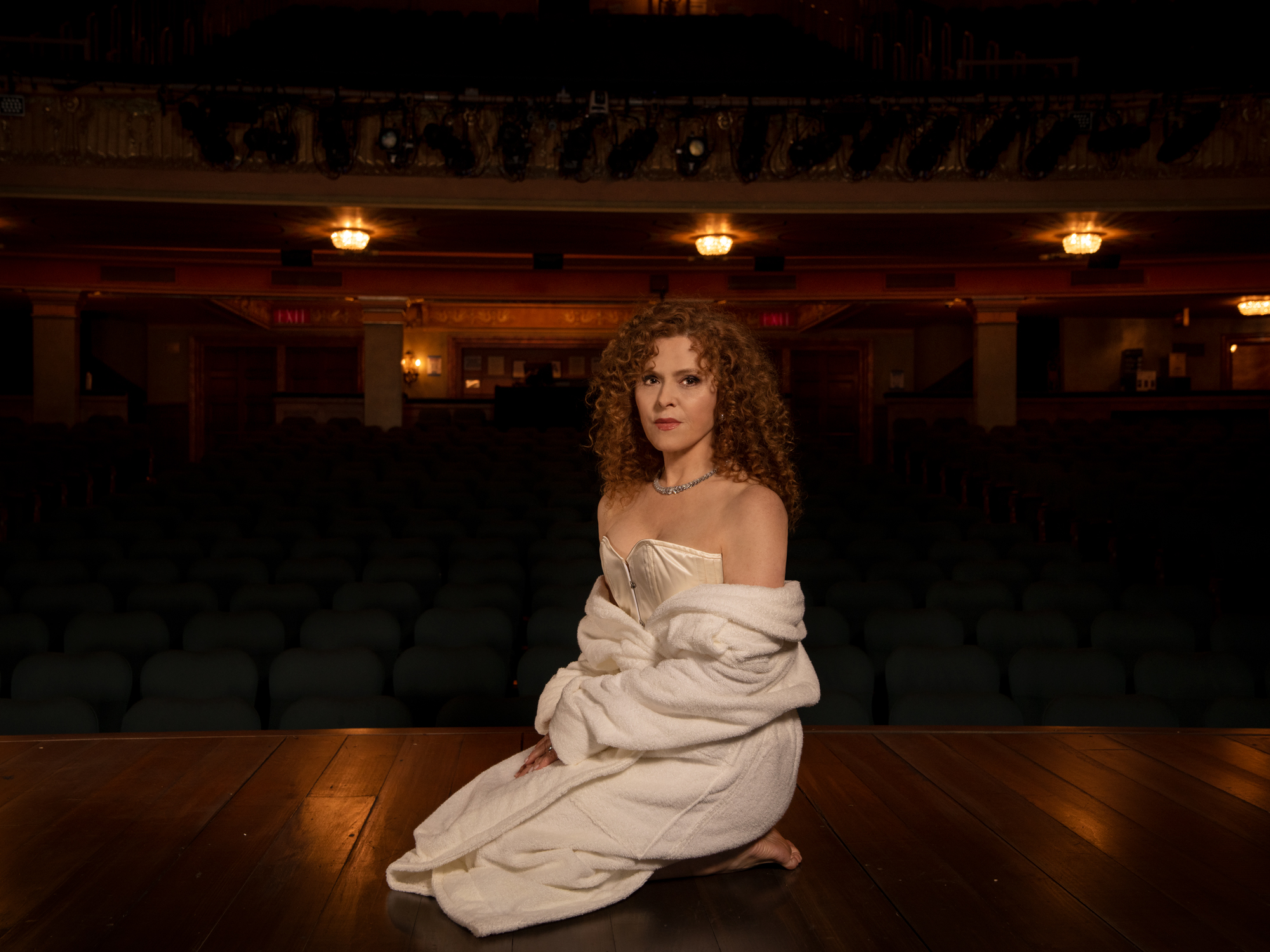
Bernadette Peters onstage at the Shubert Theater on West 44th Street. Robe by Tekla. Bustier by Orchard Corset. Necklace by Reflection De Cartier High Jewelry. Earrings by Cartier High Jewelry.
In our September issue, we assembled a portfolio of five legendary Grand Dames of Broadway who define elegance, drama, humor, and grace, and who our guest-editor Jeremy O. Harris called “the foundation of New York’s theatrical heartbeat.” In the fourth of five, the actor and singer Bernadette Peters speaks to Lin-Manuel Miranda about Broadway, enduring moments of doubt, and the biggest difference between television and theater.
BROADWAY DEBUT: Johnny No-Trump, 1967
SIGNATURE ROLES: The Witch in Into the Woods, Annie Oakley in Annie Get Your Gun
TONY AWARDS: 3
YOUTUBE IT: “No One Is Alone”
INTERVIEWED BY: Hamilton creator Lin-Manuel Miranda
———
LIN-MANUEL MIRANDA: I’m thrilled to get to talk to you more in-depth. Usually we talk socially, but now I have an excuse to ask you questions I’ve always wanted to.
BERNADETTE PETERS: I want to start by thanking you for saving the Drama Book Shop.
MIRANDA: I used to go there when I was too broke to buy plays. I would sit on the floor and read the plays I wanted to read. Then I spent my twenties there with Tommy Kail [director of In the Heights and Hamilton] working on In the Heights in the basement, so it’s such a source of community for me. I was lucky enough to get an early copy of James Lapine’s upcoming book on the making of Sunday in the Park with George.
PETERS: I haven’t even read it yet.
MIRANDA: You’re going to love it. It is as inspiring as the show itself is to artists and those of us who are lucky enough to do this for a living. I’m so curious as to why you said yes. You were a movie star at that point, and then you came back and did a show at Playwrights Horizons that didn’t have a fucking second act.
PETERS: Well, James contacted me. I was doing a club date at the Fairmont hotel in San Francisco, and he sent me the outline of the show. I knew he had written a new show with Stephen Sondheim, who I was intrigued by, and I thought this could be something wonderful. The best part was that it was just a workshop, so I didn’t have to continue if I wasn’t feeling good in it. The weirdest part was, I said, “You know who should play George? Mandy Patinkin,” and he goes, “Well that’s really interesting because that’s who’s going to play George.” It was one of the most incredible experiences. The first act wasn’t finished, and every day Stephen would come in with a new song, and it was like we were seeing it being created before our eyes.
MIRANDA: It is such an extraordinary leap of faith you took to sign onto an unfinished project. Reading the book, one of the things that comes across is there are a lot of times where you’re really the grown-up in the room. Stephen was still licking his wounds from the critical reception of Merrily We Roll Along, and this was James’s first thing on this scale. One of the themes of that book is what a pro you were at a time when everyone was still learning how to be pros around you.
PETERS: I didn’t read what James wrote, but he always seemed to allude to the fact that he would look to me to see how things were going. I just looked straight ahead, like, “Let’s do it, let’s live in the creative process and not play games or be silly.”
MIRANDA: It’s really extraordinary and could never happen today. I shudder to think of opening a show on Broadway without a completed second act. And if I could pick any show in time I would want to see, it would be the first night Mandy got to sing “Finishing the Hat,” and the first night the two of you got to sing “Move On.” I can’t imagine what that felt like.
PETERS: Just thrilling. We all knew we were in something that was really remarkable and that’s what kept the juices flowing. You know, I saw Hamilton downtown and you were still sort of working on it.
MIRANDA: Yeah, there’s a lot that didn’t make it from The Public to the Richard Rodgers Theatre. Our first preview night came in at 3 hours and 12 minutes. One of the things that Tommy did—because he has such a good sense of people and actors—was cut my best verses, which were this rap battle screed against John Adams. They were delicious to perform but John Adams didn’t appear onstage, so we were like, if they don’t appear onstage, we can’t fight with them. But by cutting that first, he sent a signal to the rest of the company, saying, “Listen, I’m cutting the composer’s best verse. This is not about you or your performance. It’s about getting the best and leanest story possible. This is not personal.”
PETERS: This was rap, so it was all so new to Broadway audiences. I remember Leslie [Odom Jr.] came out and he was the first one to speak, and the way he did it, we understood everything he was saying.
MIRANDA: It’s the momentary panic that you have at the beginning of every Shakespeare play. I’ve seen Romeo and Juliet a million times, but as soon as they start speaking, I have this moment of panic, like, “Do I remember how to listen to Shakespeare? Am I going to be lost for two hours?” But then you’re dialed into the station. I want to talk about how you got started, because you started very young. Did you have a show business family?
PETERS: My mother wanted to be an actress, but her mother came from Italy, so in her eyes that was “a streetwalker,” so she wouldn’t let her. My sister went to a high school for the performing arts. My mother said I sang in front of the TV, which is probably true because I do love music so much, and I just found myself growing up in the business. I know you directed your first movie, Tick, Tick… Boom! You played that role, didn’t you?
MIRANDA: I did. They have something called “Encores! Off-Center” where they do off-Broadway shows that didn’t have very long lives, and I got to play Jonathan Larson. It was like one foot in the past, and one in the future. My costars were Karen Olivo, who was in In the Heights, and Leslie Odom Jr., who would be my future costar in Hamilton.
PETERS: Did it give you insight when it came time to direct it? Of course you have one of my favorite actors, Andrew Garfield, in the lead role.
MIRANDA: Yes, in a very concrete way. Just a little history on that show: Jonathan Larson spent his twenties writing this musical called SUPERBIA that no one ever produced. Everyone said it was too weird, too expensive, too allegorical, and so he basically said, “Fuck you all!” He wrote Tick, Tick… Boom!, which was this very loosely autobiographical show about him turning 30, and him being the only one still banging his head against the wall of his childhood dream, while his friends are growing up and getting other jobs, which is incredibly relatable. After he passed away, his friends and producers commissioned it into a three-person show that ran off-Broadway, and I saw that in my senior year of college, the month after September 11. Everyone was fragile, and then I saw this show that felt like a private message in a bottle to me. It was like, “Hey, you want to write musicals for a living? It’s this fucking hard, and it’s this fucking rewarding if you stick to it, and your friends are going to peel off, and that girl sitting next to you is not going to be going to New York for acting, she’s going to get another job.” It was a sneak preview of what my twenties would be like. It was the “keep going” I needed at the moment. We all have those moments of doubt and some hummingbird appears at your window in some form.
PETERS: It’s so true.
MIRANDA: I’m here with my editor and I said, “I’m about to go interview Bernadette Peters, is there anything you want to ask?,” and we just talked about The Jerk for like 15 minutes, but also more recently, Mozart in the Jungle. Where do you get the adrenaline rush from movies and TV versus theater?
PETERS: My life and my creativity is all about learning how to get out of the way. TV is a great medium that goes into people’s homes, and it’s good to do things that can be—especially in these times—not stupid, but uplifting and maybe not so dark. The last show I did was Zoey’s Extraordinary Playlist which got canceled, but it was a musical. Lin, you should do musicals on TV.
MIRANDA: I’m going to try at some point, but I don’t think I’m tough enough yet. To write three original songs every episode, for 21 episodes, is an endurance feat. But you talk about acting and getting out of your own way, and there is that incredible, delicious tension when you’re acting in a musical, because of course the music is all written, the literature is all written, but your job is to be completely present as if you are saying these things and discovering them for the first time. You’re one of the best practitioners of that. What I’m thinking about right now is the Sondheim 80th birthday concert, where you reunited with Mandy and sang “Move On.” Lord knows how many times you’ve sung that song, but it still felt like you were discovering it for the first time.
PETERS: When you come back to something like we did, you’ve lived that many more years, you’ve had that much more life experience, and then you bring all of those experiences to it. It’s a privilege to do that.
———
Makeup: Oslyn Holder at Basic White Shirt, LTD.
Photography Assistant: Lance Charles.
Fashion Assistant: Kiana Polk.
Special Thanks: Shubert Theatre.

